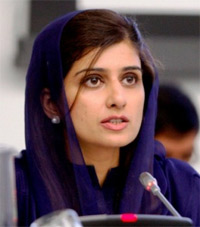 October 7: A Pakistani parliamentary panel on Friday criticised the Interior Ministry for the delay in implementing a new visa agreement with India, with its members passing a resolution that called on the cabinet to ratify the pact at the earliest.
October 7: A Pakistani parliamentary panel on Friday criticised the Interior Ministry for the delay in implementing a new visa agreement with India, with its members passing a resolution that called on the cabinet to ratify the pact at the earliest.
Foreign Secretary Jalil Abbas Jillani informed the Foreign Affairs committee of the Senate or upper house of the parliament that the ratification of the visa agreement by the cabinet was pending because the Interior Ministry is yet to complete certain formalities.
The committee's chairman, Haji Mohammad Adeel of the Awami National Party, and other members of the panel were critical of the delays in implementing the agreement.
Presidential spokesman Farhatullah Babar, who is a member of the committee, proposed a resolution that the cabinet should ratify the pact at the earliest and this was passed by the members.
Adeel condemned the delay in implementing the agreement.
Noting that relations between Pakistan and India were improving, he questioned why such an important agreement was being held back.
The Foreign Secretary explained that under the Indian system, the process for implementing the agreement had been finalised before it was signed last month.
On the Pakistani side, the process is completed after the signing, he said. He briefed the panel on all the clauses of the new agreement.
Foreign Minister Hina Rabbani Khar, who too appeared before the committee, said the delay in implementing the pact was only due to “procedural” issues.
Officials assured the panel that the agreement would be forwarded to the cabinet division next week so that the process of ratifying it could be completed.
Farhatullah Babar suggested that provisions for granting visas to reporters should be incorporated in the agreement as the media plays a key role in fostering better relations between the two countries.




Comments
Add new comment